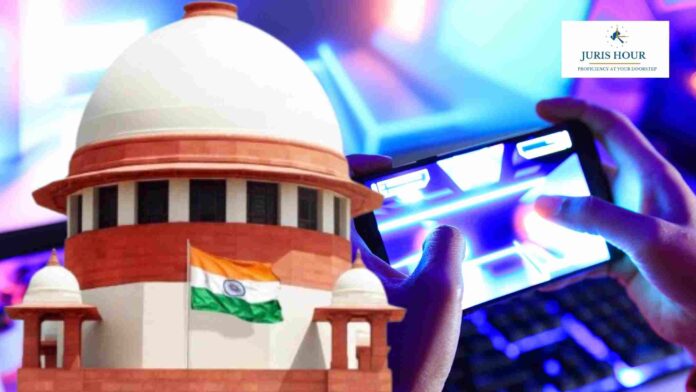The Supreme Court has agreed to urgently list petitions challenging the Promotion and Regulation of Online Gaming Act, 2025, following the Centre’s successful plea to transfer all such cases pending before different High Courts to the apex court.
The bench of Chief Justice of India (CJI) B.R. Gavai, while responding to a mention made by counsel for one of the petitioners, assured that the matter would be listed for hearing at the earliest. The counsel had highlighted that several gaming businesses had been forced to shut operations, adding:
“Our petition was before the Karnataka High Court, which has now been transferred here at the instance of the Centre. We request that it be taken up urgently.”
Centre’s Transfer Plea Allowed
Earlier this week, a bench comprising Justices J.B. Pardiwala and K.V. Viswanathan allowed the Centre’s transfer petition, directing that all proceedings challenging the Act before various High Courts be moved to the Supreme Court. The bench categorically held:
“The transfer petition is allowed and the proceedings are transferred to this Court. We make it clear that no other High Court will entertain a challenge to the said law and proceedings will stand transferred to this Court.”
As a result, matters pending before the High Courts of Delhi, Karnataka, and Madhya Pradesh have now been consolidated before the apex court.
Challenges by Gaming Companies
The legislation has drawn strong opposition from online gaming companies, which argue that the law unfairly conflates skill-based games with games of chance, effectively imposing a blanket prohibition on money-based gaming.
Head Digital Works (A23) approached the Karnataka High Court, arguing that the Act violates Article 19(1)(g) of the Constitution (right to practice any profession or to carry on any occupation, trade, or business). The petition relied on earlier Supreme Court judgments that classified games like rummy, poker, and carrom as predominantly skill-based, placing them outside gambling restrictions.
Bagheera Carrom (OPC) Pvt. Ltd., developer of an online carrom platform, also challenged the Act in the Delhi High Court. Represented by advocate Udayan Jain, the company contended that the law is unconstitutional, arbitrary, and ultra vires, alleging a lack of stakeholder consultation and infringement of fundamental rights under Articles 14, 19, and 21. It further argued that the legislation violates federal principles and the doctrine of separation of powers.
Both petitions emphasized that instead of outright prohibition, less restrictive alternatives—such as regulation, age-based restrictions, and self-exclusion mechanisms—could have been adopted.
Centre’s Stand
Defending the new law, Solicitor General Tushar Mehta informed the Delhi High Court earlier this month that the Union government was in the process of notifying the Act and would soon constitute a regulatory authority along with supporting rules.
Mehta clarified that the government is not against online gaming per se but is opposed to money-based online games, which he described as a “public health menace.” Citing disturbing trends, he said such games have led to addiction and, in some tragic cases, even suicides among minors.
Legislative Background
The Promotion and Regulation of Online Gaming Bill, 2025 was introduced in the Lok Sabha on August 20, passed by both Houses within two days via voice vote, and received Presidential assent on August 22.
The law, described as a forward-looking digital policy initiative, seeks to strike a balance between encouraging innovation in India’s gaming sector—particularly e-sports and social gaming—while imposing strict restrictions on exploitative money-based online games.
The Act is structured across six chapters, dealing with:
- Promotion and regulation of legitimate online gaming,
- Prohibition of money-based online games,
- Creation of a regulatory authority,
- Consumer protection and safeguards for vulnerable users,
- Enforcement mechanisms, and
- Penal provisions for violations.
Electronics and IT Minister Ashwini Vaishnaw, while introducing the Bill, had underscored the economic and social harms of online money gaming, noting that 45 crore Indians collectively lose nearly ₹20,000 crore annually on such platforms.
The Core Debate
At the heart of the legal battle lies a fundamental clash:
- The Centre’s position that online money gaming is akin to gambling and poses serious risks to youth and vulnerable sections.
- The industry’s argument that skill-based games are constitutionally protected business activities, and Parliament lacks the competence to ban them outright.
With all petitions now before the Supreme Court, the upcoming hearings are expected to determine the future of India’s online gaming ecosystem—an industry projected to be worth billions but currently facing existential legal uncertainty.

